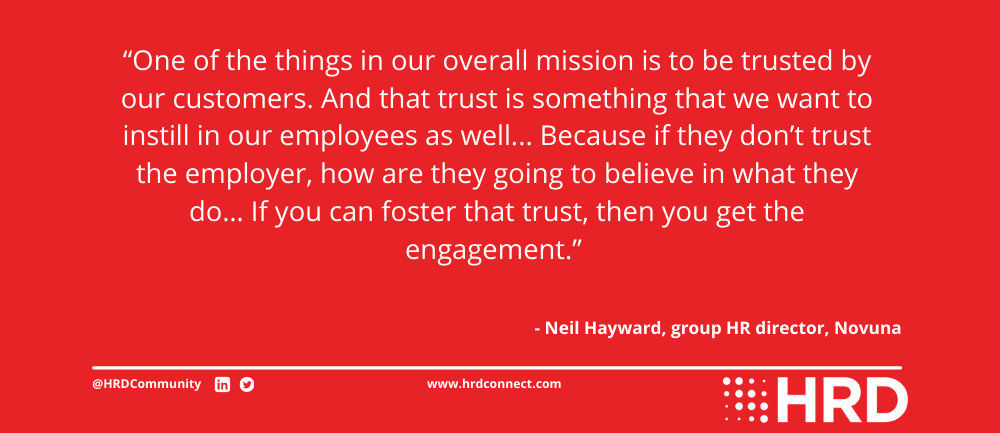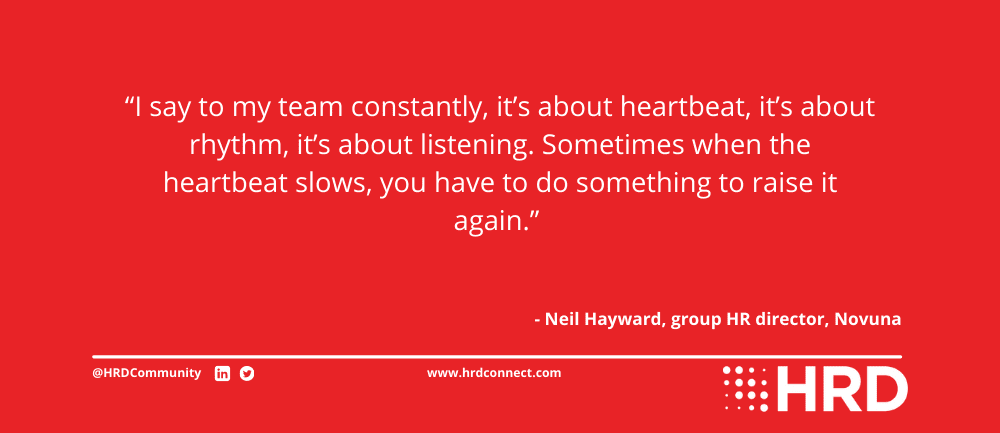-
Provided by

- Date published: Feb 17, 2022
- Categories
Novuna, a trading style of Mitsubishi HC Capital UK PLC (the new name for Hitachi Capital (UK) PLC as of 14 February 2022), has won a great victory in the ranks of the Glassdoor best employers awards.
Voted as the No. 1 best financial services company to work for in the UK on Glassdoor, the business has never before broken into the Top 50. Today, it celebrates its position as the 11th best place to work overall in the country.
So what’s the secret?
We talk to Neil Hayward, group HR director at Novuna, which employs over 1,600 people and is now part of Mitsubishi HC Capital Inc., one of the world’s largest and most diversified financial groups , on what they’ve been doing to produce the outstanding results.
An employee-first culture
Despite existing in the financial sector, Neil says that Novuna is keen to be distinctly different to banks when it comes to culture.
“What we mean by that is that we want to have that flexibility; our culture is all around innovation. It’s around putting our customers at the heart of everything we do,” says Neil.
And to drive customer success, Neil says it all starts with an employee-first culture.
“Certainly in my time it’s all been about that link between employee engagement and satisfaction. And if you get that right on the employee side, that helps in terms of looking after your customers.”
This cultural approach became pivotal during the pandemic. With zero staff furloughed throughout, Novuna ensured its priority was always on employee safety and wellbeing. An example of this is in the business’s choice to apply flexibility to their bonus schemes and focus on other key factors, not just financial measures to reflect the new times they were in.
“The initial thought was immediately to put the focus on our customers and on our employees. Because if the employees felt safe, and they were well looked after, then that would translate to our customers,” says Neil.
“As well as resetting the financial measures we included customer outcomes and employee outcomes as measures of success. We set targets around employee safety, retention and levels of engagement as we felt they were fundamental in ensuring our employees could deliver a great experience to our customers.”
Employee engagement was particularly crucial to manage in the pandemic because the financial sector workload boomed. With people having financial concerns around areas such as debts, it meant that Novuna’s people were snowed under.
As a result, the bonus aimed to reflect the hard work and great customer outcomes during the pandemic and one of the busiest periods the organisation had ever been through.

Listening is key
But ensuring their employees’ wellbeing went far beyond paychecks and bonuses. Neil explains how HR put their heads together to find new ways of supporting their people.
“The starting point was to say ‘Ok, we do a lot of things around wellbeing already, including wellbeing initiatives, a wellbeing community within the business… and mental health champions,’” begins Neil.
“So we’ve already got some good things in place, but one of the things we were acutely aware of is people not being in the office. So how do we understand how people are feeling? How do we put those feelers out?”
Listening became the key focus for Novuna and HR at this point. If they weren’t all sharing an office space together, the business needed to create opportunities for people to share their thoughts and opinions as organically as possible.
The way Novuna did this is no secret recipe – instead it’s much like every other organisation: they put out surveys to reach their employees.
But perhaps what other organisations suffered with that Novuna didn’t was the high levels of completion rate of these surveys. Indicative of the rate of engagement throughout the company, Neil says that over 90% of employees took the time to complete each survey.
As a result, HR was able to work with an abundance of data on what was working well and what wasn’t.
“[For HR] we had to say “Ok what are the issues that we’re seeing here’… and one of the things that we were hearing was… that people were starting to like this work from home. People felt from a work-life balance, it was actually starting to work for them,” says Neil.
So, when planning a return to the workplace, Novuna naturally wanted to make sure people are ready for it. They looked at people’s different roles and needs to calculate their split between office and home.

Increased benefits
But as the hybrid conversation continues to evolve, people are questioning if something is missing. If people can’t be together in the office – at least part of the time – how can you ensure wellbeing in the long-term?
Novuna’s answer lies in increased and updated benefits. From women’s health and mental health, these new initiatives are designed to support people both at home and in their return to the office.
“We also started to think about new things, like the mind and the body… And I suppose over the course of the pandemic, we’ve very much continued that theme,” explains Neil.
“We’ve done sessions on things like menopausal awareness… and we’ve got guest speakers in. We’ve also done a lot of work around financial awareness, too.”
And while these initiatives work well in terms of supporting staff, there is a difference between authentically implementing them versus implementing them for the sake of it.
This is where the right culture is crucial. Neil mentions that values such as harmony, sincerity along with effective communication all stand as pillars – without them, wellbeing initiatives do nothing of value.
It also boils down to trust, too.
“One of the things in our overall mission is to be trusted by our customers. And that trust is something that we want to instill in our employees as well,” says Neil.
“Because if they don’t trust the employer, how are they going to believe in what they do… If you can foster that trust, then you get the engagement.”
“The only way we get high levels of engagement with our surveys is because people trust us to do something about it as a result of them sharing their views with us.”

Leadership and communication
Leadership and communication are also key ingredients to a successful and happy workforce. According to Neil, the surveys from Novuna’s staff highlighted that communication was the most improved area. And while this is partially down to technology such as Teams and Video, it’s also down to strong messaging from the top.
At the beginning of 2020, Novuna’s CEO Robert Gordon began to publish daily and then weekly blogs to communicate updates to the entire business. Now, due to the immense and continued engagement with the blogs, Neil says HR use it as a channel to tease out any new initiatives.
“We know that the highest level of engagement in terms of comms is with that CEO blog, everyone reads it in our business. So if he [the CEO] mentions something we’re doing around engagement… then that will resonate strongly with our staff,” says Neil.
This also relates to HR iterating and pivoting on initiatives as they go. For initiatives that are beginning to dwindle, it’s obvious that the staff are no longer engaged with it. So it’s important to switch it up to reflect how in tune HR are with people’s needs.
“I say to my team constantly, it’s about heartbeat, it’s about rhythm, it’s about listening. Sometimes when the heartbeat slows, you have to do something to raise it again,” says Neil.

Wellbeing and hybrid working
One of the biggest questions – and challenges – for HR today is trying to understand what the world of work will look like moving forward. How will it continue to evolve over 2, 5 and 10 years?
For right now, Novuna sees the world of work as hybrid. And for Neil, that shifts the focus on ensuring the wellbeing of employees throughout this new way of working.
“How are they going to manage their work-life balance? What are some of the benefits of working in that hybrid way and what are some of the negatives?,” asks Neil.
“And from a wellbeing point of view… we have an obligation as a company, as a family, to support our employees through what may well be difficult times.”
This means continuing wellbeing initiatives that reflect current times, such as winter wellness. But also importantly staying in touch with issues that may arise in the near future.
Neil discusses the recent press coverage of inflation and increased cost of living in the UK. As such, the business is focusing its efforts on financial wellbeing and ensuring their people feel supported from that angle.
Neil also mentions the training they’re doing for immediate line managers to have those wellbeing conversations with their teams.
“We [HR] are running a relatively small team and we can’t spot and see everything. We’ve been doing a lot of training with our front-line managers on how to spot the signs of mental health issues, how to have those wellbeing conversations – and how not to go too far with them.”
This circles back to the marriage of human connection and other services like technology, where managers can effectively lean on technology and other services to support those conversations in the best way.

Utilising line managers will be crucial when Novuna returns to the office. Novuna’s hybrid working strategy is built around role classification, and how each role correlates to how often each person is required to visit the office.
Of course, individual circumstances are a part of the ultimate equation. And as Neil says, “90% of all of our roles are within the category that won’t require us to be in the office all the time.”
When discussing their hybrid working strategy, Neil says that the organisation originally settled on a 40/60 split for their workers, but when evaluating the responses from the survey they realised it wasn’t what their people wanted.
“That wasn’t what our employees wanted to hear, they didn’t understand the rationale,” says Neil.
“Why did they have to be in the office two days a week when their job didn’t require it?”
So, in keeping with the approach at Novuna, the business changed their plans to better reflect the voice of the employees. They instead analysed what each job would entail in terms of office time, and calculated the hybrid split from there.
“One of the things we’re doing at the moment is a business readiness plan, where each area is looking at the nature of the job to determine what is the best for that role,” says Neil.
“And then individuals will have a choice once they know that.”
This individual, employee-first approach has helped foster the transparent and trusting culture that has ultimately helped Novuna get to where they are today. From a HR perspective, it really boils down to a very simple recipe for success: listen to your employees, foster that trust, communicate with your employees and strive – where possible – to drive the change your employees are asking for.
Congratulations to Novuna on their Glassdoor position!
